- Home
- Cecelia Ahern
Every Year: Short Stories Page 3
Every Year: Short Stories Read online
Page 3
‘Excuse me,’ Shane called her as she passed.
‘Yes, sir,’ Lucy smiled.
‘“Sir”!’ He looked at Michelle and laughed. She giggled too. He pointed at the menu, ‘What’s a whores devvers?’
Lucy smiled. ‘Sir, the hors d’oeuvres on the menu are a selection of appetizers.’
‘Oh.’ Shane reddened. ‘Well we won’t have that, then, we’ll both just have steak and chips.’ They both looked nervous.
‘It’s not on the menu, though,’ Michelle added quickly.
‘I’m sure that won’t be a problem,’ Lucy said, taking their menus. ‘How would you like your steak cooked?’
They looked at each other again. ‘Eh, fried?’ Shane spoke up.
Lucy bit her lip. ‘Rare, medium or well done?’
‘Oh.’ He reddened. ‘Well done.’
‘The same,’ Michelle said quietly.
Lucy never had anyone to learn things with like Shane and Michelle. Together they were going for a meal by themselves for what appeared to be the first time. They were learning about new foods, the different language used and how to speak up and ask for things themselves. Lucy had never shared moments like that with anyone. Everything she had learned was by herself. Of course she had been out on dates and had boyfriends but none of them were long-term and none of them helped her discover anything new about the world or about herself. Apart from the fact that they didn’t love her and that she didn’t love them.
She scanned the restaurant. There were ten tables for two so far with ages ranging from sixteen to sixty. All different kinds of love: new love, old love, stolen love, couples sitting in silence, others unable to keep their hands off each other, some in serious conversation, some laughing loudly. Lucy’s eyes filled again and she scanned the reservations hoping for no more tables for two.
Clarke x 6.
Ha! Thank god, Lucy thought, the mist clearing from her eyes.
But when the six arrived she realized it was three couples, and there was nothing worse than a couple in love except three couples in love. The words table for two echoed and bounced around her lonely head as she overheard snippets of fights, tears, laughter and love from each table. Surrounded by crowds of people all night, never physically being alone but all the time feeling it.
Standing at reception, she heard the door open and close. Her heart dropped. She was tired, her eyelids were drooping and her feet and back were sore. How could the positive energy of so much love in the room drag her down so much?
‘Welcome, sir.’ Her colleague stepped in for her as she made herself busy by crossing out reservations and updating the sheet.
‘Hello. A table for one, please.’
And there it was. The voice she had so desperately needed to hear. The voice of a stranger that would lift her out of her dark spell. Her head shot up, her eyes twinkling with happy tears. She was faced with a man aged what she would guess to be in his mid- to late thirties.
He looked her way and gave her a small smile. He wore a long navy-blue cashmere coat, with a brown Burberry scarf wrapped around his neck. His hands looked cold as he rubbed them together and glanced around the restaurant. Lucy’s heart danced with delight at the man’s request. A young man. Ordinary-looking. No rings on his fingers. A table for one! He had said it proudly, strongly, as if there was nothing at all wrong with it. Lucy loved to hear it roll off his tongue. She wanted to hear it again. A table for one! Halleluiah!
‘I’m sorry, sir, if you don’t have a reservation I’m afraid we can’t accommodate you,’ her colleague apologized.
‘What?’ Lucy snapped, her head turning to face her colleague. It was as if the record she was dancing to in her head had abruptly scratched to a stop.
‘Lucy,’ he hissed, pulling her away from the desk and out of earshot of the gentleman. ‘What are you doing?’
‘We have one table free,’ she defended herself. She pointed down the restaurant at it. There it was by the window with a beautiful view of the park.
‘That’s a table for two,’ her colleague said, dismissing her. ‘We’ll fill that by the end of the night.’ He took a step back towards the desk to the man.
‘We’ll fill it now,’ Lucy said far louder and sharper than she had intended.
‘Excuse me one moment, sir.’ Her colleague spun around on his heel with a face like thunder, ‘What are you doing? he hissed. ‘Are you mad? We’ll make more money with a table for two.’
More money. Lucy’s eyes filled with tears. ‘No.’ Her voice shook quietly. No, she couldn’t let this happen. She couldn’t let being alone lose out to being in love. While she was lost in thought she heard the door open, she looked up and saw a couple approaching them.
‘A table for two, please.’ The man smiled.
‘Do you have a reservation? her colleague asked.
‘No, we don’t.’ They smiled stupidly at each other. ‘This was all very last-minute.’ They gazed into each other’s eyes, their fingers entwined.
‘Certainly, allow me to take your coats.’ He held out his hands and said very softly to the lone man still waiting at the desk. ‘I’m very sorry, sir, we’re fully booked.’
Tears spilled over the brim of Lucy’s eyes. She felt the warm salty water run down her cheeks and drip from her chin. No one noticed her. No one ever did.
She just rattled along, shuddering occasionally through life, doing the same routine, helping people, bringing them from A to B but never joining them, stopping and starting, starting and stopping. Never being allowed to go her own pace or change route.
Well not this time. She dried her eyes.
‘Excuse me, sir?’ she called out loudly to the man pulling the door open.
He stopped and turned.
‘There seems to be a mistake,’ she said politely to the couple before her. ‘This man was here before you and he will be seated at our last table. I’m very sorry for the inconvenience, but my colleague was confused.’ She smiled sympathetically at them.
Her colleague’s jaw dropped and he was faced with the awkward situation of apologizing to the couple.
‘Allow me to take your coat, sir,’ Lucy said, eyes shining as she held her hand out to take the lone gentleman’s coat.
He took her hand in his, it was warm. ‘Thank you,’ he said softly. Lucy blushed.
‘You’re welcome,’ she whispered back.
She took his coat, led him to his table, handed him the menu and lit the candle in the centre of the table.
That night, on the 14th of February, the day she always hated, thirty-year-old Lucy fell in love for the first time, with the man at the table for one.
It quickly became a table for two.
4 The Calling
‘Seven and eight, seventy-eight.’
Her age.
Mags threw her eyes up to heaven and grumbled under her breath, in her raspy voice.
‘What’s that love?’ Agatha shouted, moving her ear closer to Mags’s head. ‘You’re going to have to speak up, love, it’s me deaf ear you’re sittin’ beside.’
Mags wrinkled her nose up in disgust as she watched the black wiry hairs clinging to Agatha’s chin bounce up and down as her mouth opened and shut. Her teeth became loose from her palette and were quickly clamped back into place as Agatha’s bloodshot, tired, grey eyes darted around the table to see if anyone had noticed.
Mags threw her eyes up again and mumbled questioningly to the Good Lord.
‘Wha’?’ Agatha’s blue rinse brushed off Mags’s forehead as she leaned in to hear. Mags shook her head and swatted Agatha’s head away as though it were a fly. She concentrated on what was going on ahead of her again.
‘Two and two, twenty-two.’ The year she was born.
She gritted her teeth and exhaled loudly. She leaned slightly to the left in her chair to sneak a glance at how her neighbour was progressing. The woman slowly raised her hand and covered her card. Mags raised her eyes slowly from the wrinkled hand blotched with brown
patches, and came face to face with a tight smile.
Mags cleared her throat awkwardly, sat upright in her seat and tried to look insulted as she covered her own card with her hand as if to accuse her neighbour of cheating. The woman grunted and pulled her chair away from Mags. The steel chair legs, which had long lost their rubber grips, screeched along the tired oak floor. Faces winced and looked up. Her neighbour’s face reddened and became buried in her hand as pained expressions stared at the cause of all the noise. Mags ‘hmmphed’ loudly as though she had been victorious in that particular round.
‘WHAT’S EVERYONE LOOKIN’ SO MOANY FOR, MAGS?’ Agatha shouted, while looking around confused. ‘DID SOMEBODY FART?’ She sniffed the air and moved her head around animatedly, not wanting to be left out of the group’s obvious discomfort. ‘I CAN’T SMELL IT, MAGS,’ she shouted again. ‘IS IT AWFUL? IT MUST BE AWFUL.’ She sniffed the air one last time, then shook her head, looking defeated. ‘CAN’T GET IT OVER HERE AT ALL.’
‘AAGH! JAYSUS, I’M DEAF, NOT NUMB, MAGS. WHAT’S WRONG WIT’ YA?’ She looked at her friend with a horrified expression while rubbing her sore side.
‘Would you ever shut your trap, Aggie O’Brien,’ she hissed.
‘WHA’?’ Agatha yelled, moving her head closer to Mags.
Mags stared at the blue-rinse mound of curls that had been shoved in her face and tutted at the patches of pink skin that were visible through the thin wispy hair. After not hearing a reply, Aggie turned to face Mags in order to read her lips. The two thin red lines were pursed, the deep cracks in her skin gathering around her mouth as though being pulled by a drawstring. A crooked finger stood perpendicular to her lips with a bright-red nail ordering her to, Stop!
‘Sshh!’ was all Aggie could just about make out. Then she realized what her friend meant.
‘OH JAYSUS, SORRY, MAGS,’ she yelled a little less loudly but not so much that the surrounding tables couldn’t hear. ‘I DIDN’T REALIZE IT WAS YOU THAT DONE IT. SURE I CAN’T EVEN SMELL IT MESELF AND I’M RIGHT BESIDE YOU.’
Mags’s cheeks pinked as they always did when she was embarrassed, looked as though she had dabbed two balls of baby-pink blusher onto her cheekbones. Her father used to say she was as pretty as the pink carnations that grew in her mother’s flower garden of their country home. A circus clown, her mother had always used to rant angrily as though the very vision of them offended her. Her mother would cover her face in clouds of white powder before Mags would head out to the local dance on a Friday night. No daughter of hers would find a man with awful pink cheeks on her face, especially not her only daughter. The bristles of the powder brush used to scrape away at Mags’s cheeks, causing her eyes to water and her irritated skin to redden even more. Faster and faster her mother would brush, nearly scraping the layer of skin away so it would reveal pure whiteness. The angrier and angrier she would get, the redder and more sore-looking her daughter’s face would become.
Twice a week Mags would have to endure this. Once on a Friday before the local dance and again on the Sunday morning before they walked along the potholed road to eight o’clock mass. Mags would have to sit for an hour for her mother while she tied up her hair and powdered her face. Mags wondered why she couldn’t just dip her face into the bowl of flour her mother left sitting on the kitchen counter in preparation for the Sunday homemade apple tart. At least that way not a pink blotch would be in sight.
She would be ordered to sit still, afraid to move a muscle in case she felt the sharp sting of the back of the brush against her flesh, which inevitably caused her cheeks to turn rosy. It was a vicious circle. So she sat tight, hands on lap, back straight (‘A man wouldn’t want a wife with bad posture now, would he, Margaret?) while her five brothers could remain in bed for the extra hour. Mags often felt like questioning her mother on why it was that men didn’t need to make the same effort for women. Mags certainly had no desire for a man who smelled of cow manure, sweat thick with the stench of stale black coffee, muddy big black boots with faded trousers and dried muck in the creases, tucked into their thick black socks (no doubt darned by their mothers and sisters) all held up by a pair of braces. Mags was convinced that the only reason for these was so the men would have a place to rest their thumbs while they stuck their chests out and strolled the town as if they hadn’t a care in the world.
Mags had sometimes wished, while sitting for her mother, that she had been born a man. There were few or no rules, fewer expectations and what appeared to be no pressures apart from watching the weather and worrying about the amount of milk they could get from the cow that morning. But she wouldn’t dare share these thoughts with her mother, especially while she had the spiky brush in one hand and a lock of her black silky hair firmly grasped in the other. Mags doubted her mother would have a problem scalping her in an instant; however, the only thing that held her back was the knowledge that a bald patch on a girl is not easy on the watchful eye of a hot, red-blooded young male. No, the hair remained untouched—it was pulled at and twisted, knotted and pinched, but remained unscalped.
Once ready, her mother would call the boys. Mags would hear them mumbling and grumbling and moaning about having to get up at such an early hour. Mags would stare desperately in the mirror at her reflection, her powdery white face appearing ghostlike against the whitewashed walls of her bedroom in the background. While her mother banged around the boys’ bedroom, pulling open curtains and laying out clothes, laughing and pretending to be angered by their protests but secretly loving the attention, Mags sucked in her cheeks, widened her eyes and pretended to float around like the ghost she felt like. It was as though her mother wanted her to be invisible and it wasn’t only the makeup that made Mags feel it.
Her father, when he wasn’t at the pub or working the farm, doted on her. Her mother despised her for it. But he wasn’t one to argue with the woman he married, and, sure, didn’t she know best how to treat a growing young woman when she herself was one? One thing Mags loved him to disagree with was all the makeup she wore going to see The Lord in His House. ‘Our Lord doesn’t need nor require young Margaret to wear a mask in his home, Grainne.’
‘Ah, yes, but our Lord does want young Margaret to find a suitor so she doesn’t grow old a shamed woman. And unless the Lord requires her to be a nun there is no need for her to be without a man. The world isn’t designed for a woman without a man and as far as we know she hasn’t received the Calling.’
Her parents and five brothers had all stopped walking at that point to stand still and stare at Mags. Her cheeks flushed instantly and her mother let out an exasperated sigh as though Mags was deliberately acting out against her mother’s hard work.
Mags gulped and stared back at her family wide-eyed. ‘What is it?’ she stammered.
Her mother shook her head sadly at the lack of grace of her daughter.
‘Have you received the Calling?’ Jackie, her twenty-year-old brother had asked her with a smirk on his face.
‘Margaret! Margaret!’ Her younger brother had called her name playfully in the background.
To Mags’s surprise, her mother started laughing and then immediately smacked her son over the head with her handbag for joking about the Lord. Only Mags’s father watched her face curiously.
‘Em, no, I haven’t,’ Mags whispered in embarrassment. He simply nodded his head once as he absorbed this information and then continued on walking. The rest of the family trudged on after him, overtaking Margaret, whose feet remained firmly fixed to the spot with pure terror and shame. She knew what they were all thinking: if she hadn’t received a calling like Kathleen from down the road and she hadn’t courted a man at the age of twenty then maybe she was one of those ‘funny ones’ that cut their hair short and moved to the city.
‘Hurry along, Margaret,’ her mother had spat angrily, even more disappointed. ‘The Lord waits for no one, especially not twenty-year-old girls who dilly-dally.’
Margaret’s heartbeat quickened at her mother’s tone and she ra
n to catch up with her family.
‘Sorry,’ she had whispered to their backs as they walked ahead of her. And she had meant it. Sorry she wasn’t more like them. Sorry she lacked the social graces of her mother, the personality of her father, the popularity of her brothers, the beauty of all the other girls in the town.
They arrived at the church at 7.30 in the morning, as they did every week, and gathered with the rest of the congregation for the next half-hour. Mags hated the way the women gossiped about that week’s scandal, hated how her mother pretended not to be interested even though Mags knew she looked forward to those chats all week more than the mass itself. The men would talk about the weather and how it was affecting the crop. Mags loved when the weather was good because her father became a whole new man. They would stay up until all hours listening to his stories and listening to his songs, but when the farm wasn’t going well it felt to Mags as though there was a stranger in the house. He became an intruder who conversed in only grunts and monosyllabic words and appeared only at eating time. A man she didn’t much like.
Finally, the gossip would end when the church bell signalled eight o’clock. They would all pile into the church, which would quickly become packed to the brim with hung-over men, crying children, coughing teenagers, women hiding their yawns out of respect for the ‘Good Lord’ in case he struck them down for such an act of humanity. Mass for Mags was a real-life cattle mart. Her mother would herd the family down the aisle, Mags would walk towards the crucifix to hisses in her ear of ‘Watch your posture, Margaret’ or ‘Look happy for Our Lord, Margaret’ until they reached their usual spot in the front row.
Mags knew now it was no more for Our Lord than for the mice in the field, it was for the rows of young single men who lined the outer aisles, backs against the cold, white, stone walls, thumbs tucked into their braces, wandering eyes staring back at her under floppy fringes. There was one man in particular her mother had her eye on. She tried to convince her Mags it was for her of course but Mags had her suspicions. Her mother became another woman when he was around, laughing at his jokes, being shockingly polite and being far too interested in what the young man had to say for Margaret’s liking. Ploughing a field really wasn’t that comical in Margaret’s opinion and her mother never seemed as enthusiastic to listen when her father talked about it. Seamus O’Reilly was his name, a local who worked on his father’s farm and who probably would be doing the same for the next fifty years of his life. He was twenty-five years of age, strong as an ox, great with his hands and a ‘decent sort of a lad’, according to her father.

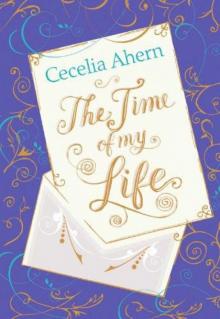 The Time of My Life
The Time of My Life Lyrebird
Lyrebird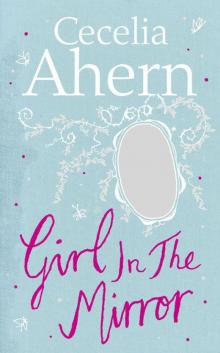 Girl in the Mirror
Girl in the Mirror Perfect
Perfect One Hundred Names
One Hundred Names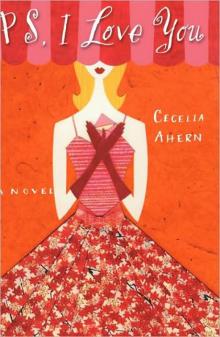 PS, I Love You
PS, I Love You Flawed
Flawed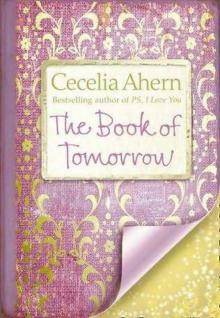 The Book of Tomorrow
The Book of Tomorrow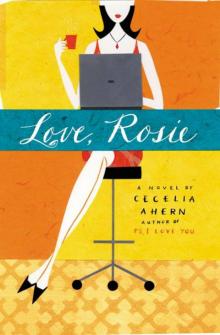 Love, Rosie
Love, Rosie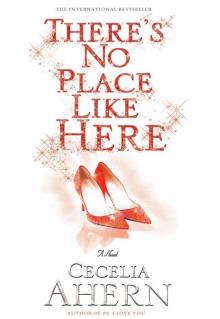 A Place Called Here
A Place Called Here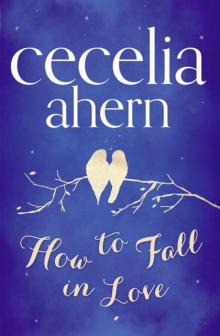 How to Fall in Love
How to Fall in Love The Marble Collector
The Marble Collector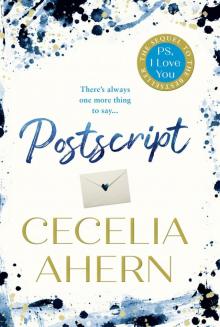 Postscript
Postscript The Gift
The Gift Thanks for the Memories
Thanks for the Memories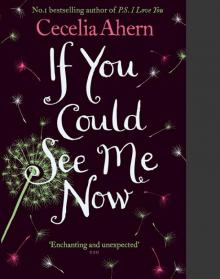 If You Could See Me Now
If You Could See Me Now Roar
Roar Cecelia Ahern 2-book Bundle
Cecelia Ahern 2-book Bundle Girl in the Mirror: Two Stories
Girl in the Mirror: Two Stories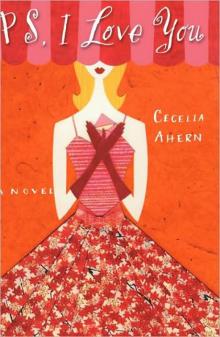 PS, I Love You: A Novel
PS, I Love You: A Novel Cecelia Ahern Short Stories
Cecelia Ahern Short Stories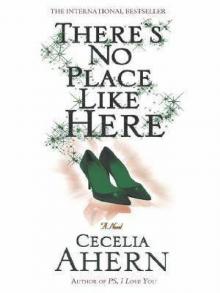 There’s No Place Like Here
There’s No Place Like Here